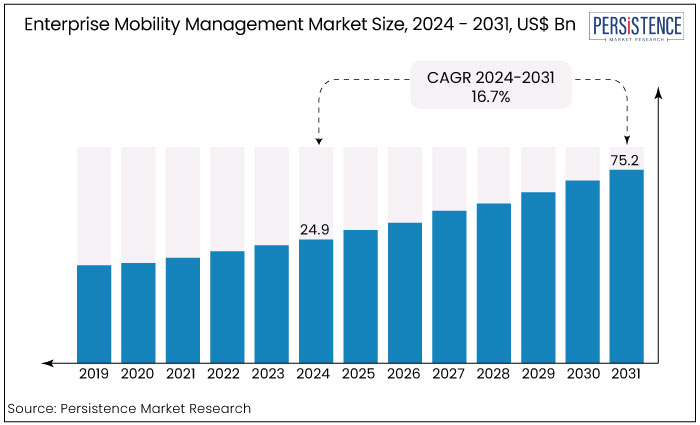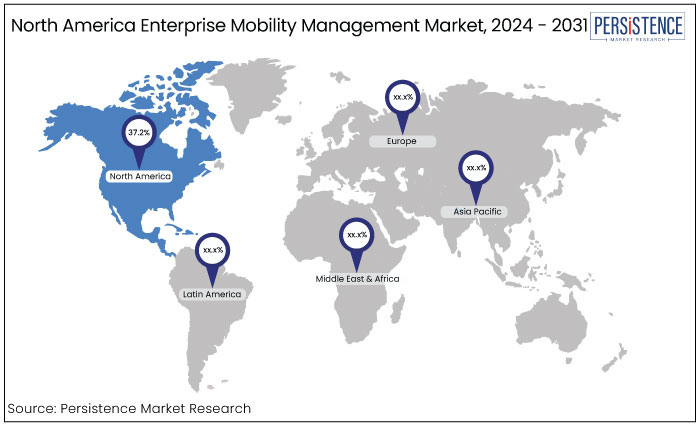Industry: IT and Telecommunication
Published Date: October-2024
Format: PPT*, PDF, EXCEL
Delivery Timelines: Contact Sales
Number of Pages: 175
Report ID: PMRREP34878
The enterprise mobility management market is estimated to increase from US$ 24.9 Bn in 2024 to US$ 75.2 Bn by 2031. The market is projected to record a remarkable CAGR of 16.7% during the forecast period from 2024 to 2031. The market is gaining momentum due to the rise of mobile devices and digital infrastructure protection. Companies are adopting EMM solutions for data safety.

Key Highlights of the Market
|
Market Attributes |
Key Insights |
|
Market Size (2024E) |
US$ 24.9 Bn |
|
Projected Market Value (2031F) |
US$ 75.2 Bn |
|
Global Market Growth Rate (CAGR 2024 to 2031) |
16.7% |
|
Historical Market Growth Rate (CAGR 2019 to 2023) |
13.1% |
|
Region |
Market Share in 2024 |
|
North America |
37.2% |
The enterprise mobility management market analysis includes the study of industry across regions, including North America, Europe, and Asia Pacific. In North America, the market is expected to lead notably due to the widespread adoption of mobility solutions in sectors like banking, retail, manufacturing, and healthcare.
North America is expected to hold a significant share of 37.2% of the target market in 2024. The healthcare sector, in particular offers tremendous potential for analytics, driven by the rise of big data analytics in its ecosystem.
As hybrid and remote work models become commonplace, managing the increasing number of mobile devices is essential for businesses. For example, in 2023, IBM launched its Watson Health platform, utilizing advanced EMM solutions to enhance data management and analytics in the healthcare industry.

|
Region |
CAGR through 2031 |
|
Asia Pacific |
26.3%. |
Asia Pacific region is projected to be the fastest-growing enterprise mobility management market with a remarkable CAGR of 26.3%. This growth is driven by significant digitalization and the rising number of mobile devices in use. Additionally, the increase in small and medium-sized enterprises (SMEs) adopting Bring Your Own Device (BYOD) policies is boosting demand for EMM solutions.
Governments in countries like India, South Korea, China, and Australia are actively enhancing their digital infrastructure, creating strong opportunities for the EMM market in the coming years. Companies in this region are contributing to innovations that fuel the industry's revenue. For instance, in 2023, Samsung launched its EMM platform, Samsung Knox, enhancing security features for mobile devices in enterprises across the region.
|
Category |
Market Share in 2024 |
|
Deployment Mode - Cloud |
62% |
The enterprise mobility management (EMM) market is segmented by deployment mode into cloud and on-premises options. Due to its numerous benefits, the cloud segment leads the market and is projected to attain 62% of total revenue. These include centralized data security and enhanced flexibility for various EMM operations, such as mobile device security and application management.
Cloud deployment helps companies reduce costs associated with dedicated hardware and software. Additionally, cloud-based EMM solutions offer automatic data backups and secure storage, ensuring that data remains safe even during user-side issues and allowing systems to resume operations seamlessly.
|
Category |
Market Share in 2024 |
|
Component - Solutions |
58.6% |
The enterprise mobility management market is divided into two main segments: Solutions and Services. The solutions segment is anticipated to lead the market, making up 58.6% of the total revenue. This growth is fueled due to the growing use of mobile devices in organizations and the increasing need to manage them effectively.
The services segment is expected to grow substantially during the forecast period due to the urgent need to protect sensitive data generated through various applications. Companies are turning to EMM solutions to improve customer acquisition and retention while boosting customer experience and profitability.
As big data grows, vendors adopt EMM solutions to help IT teams streamline their decision-making processes. These solutions also enable the analysis of large volumes of social media and sensor data, providing valuable insights into customer, product, and operational relationships and making them easier to understand. Both large enterprises and SMEs are increasingly implementing EMM solutions and services.
The demand for enterprise mobility management (EMM) solutions is on the rise globally, driven by the increasing number of mobile devices and a growing focus on protecting digital infrastructure. In fact, the enterprise mobility management market is projected to grow significantly, with estimates suggesting a CAGR of around 16.7% from 2024 to 2031. This growth is further fueled by the adoption of Bring Your Own Device (BYOD) policies, which enhance employee productivity.
EMM contains various applications, including Mobile Device Management (MDM) and Mobile Application Management (MAM). It allows organizations to maximize productivity while controlling costs. Governments worldwide, such as Canada, are highly investing in cybersecurity. For instance, Canada allocated USD 1.9 million in February 2023 for cybersecurity projects aimed at improving data security in emerging technologies.
One of the major enterprise mobility management market trends is safety of the data. As cyberattacks on critical business data increase, companies are compelled to adopt EMM solutions to safeguard their information. One such company example is TRUCE Software based Lisle, Illinois. It joined the hands of 3Eye Technologies, a mobility solution distributor, and TD SYNNEX IT solution distributor. The collaboration aims to enhance its security solution portfolio and provide advanced EMM solutions.
The enterprise mobility management market has witnessed significant growth over the past few years, driven by the increasing reliance on mobile devices and the need for secure data management in organizations. Between 2019 and 2023, the market experienced a steady growth rate of 13.1%. This period marked a pivotal shift as businesses began to recognize the importance of managing mobile devices and applications to enhance productivity while ensuring data security.
As we look ahead to 2024, the EMM market is projected to accelerate further, with an anticipated growth rate of 16.7%. This rise can be attributed to several factors, including the ongoing digital transformation initiatives across various sectors, the proliferation of Internet of Things (IoT) devices, and an increasingly mobile workforce that demands flexible work solutions.
The emphasis on Bring Your Own Device (BYOD) policies among organizations is driving the adoption of EMM solutions. The EMM market has laid a strong foundation for future growth, transitioning from a period of steady development to one of rapid expansion. Companies that invest in advanced EMM solutions will be well-positioned to thrive in this evolving landscape.
Increasing Remote Work
The COVID-19 pandemic has pushed companies to embrace remote work more than ever. As a result, there's a growing need for mobility in the workforce. More businesses are turning to EMM solutions, which allow them to manage, update, and even remotely wipe data from devices.
With remote work becoming the norm, managing mobile devices is crucial to maintaining cybersecurity. Companies have invested heavily in robust VPNs and mobile devices to keep employees productive, but security often takes a back seat. The surge in demand for mobile device management, especially for Apple products, highlights the urgent need for effective EMM solutions to protect sensitive data. This demand boosts the enterprise mobility management market expansion.
Evolution of the BFSI Sector
Over the past two decades, the banking, financial services, and insurance (BFSI) sectors have undergone a remarkable transformation. With the rise of digitization, there's a growing demand for quick responses in Internet services and international transactions.
BFSI has shifted from requiring customers to visit physical locations to providing services directly to their homes. These institutions handle sensitive financial and personal data, which they rely on to offer tailored services. To enhance security, many financial organizations are adopting modern cybersecurity strategies, including the Zero Trust model, which helps strengthen their defenses. This shift is primarily driven by the need to comply with security regulations in the BFSI sector.
Lack of Flexibility and Agility
Many vendors providing enterprise mobility management solutions need help to tailor their offerings to meet specific business needs. Companies often express frustration over a lack of flexibility and agility, especially with multi-user connections. Each organization has unique security requirements for mobile devices accessing their networks.
Additionally, vendors encounter challenges integrating EMM into existing security and management systems. However, the right EMM solution can significantly boost both security and efficiency, enabling IT admins to manage systems from a single point. Since every business has different needs, implementing EMM solutions should be customized to ensure a seamless user experience. This approach fuels enterprise mobility management market demand.
Need for Multiple Workflow Automation Systems
Organizations need to implement multiple workflow automation systems that work together seamlessly. It is essential for these systems to be interconnected so that critical data can be easily shared. Similarly, mobile devices like smartphones and laptops must integrate smoothly with complex business systems.
If these devices aren't properly connected, it can create information silos where important information is trapped on one device and not accessible to the wider company network. For instance, an employee working from home might forget to share vital files when transitioning to a new job, leading to an information gap. Therefore, advanced applications are necessary to facilitate interaction between various business systems and streamline data processing and workflows.
Increasing Cyber Attacks
The report highlights a troubling rise in enterprise mobile phishing attacks. The US FBI's investigations reveal that spear phishing cost US businesses over 1.8 billion dollars in 2020, up from 1.7 billion in 2019. However, generic phishing cost 54 million dollars in losses in 2020, indicating the increasing sophistication of recent attacks. With more mobile devices being used in the workplace, these attacks are becoming more frequent, making it essential to train employees on mobile security best practices.
To combat these threats, companies need skilled cybersecurity professionals to work closely with developers. New businesses should encrypt all data using cryptographic hashes, ensuring that the system verifies each file's digital signature for integrity.
As per Accenture's report for security, in 2020, companies spent around US$110 Billion across the world to safeguard against cyber?attacks. If unauthorized access occurs, the system can alert the relevant parties. Implementing multi-factor authentication for all network users can further restrict access. Additionally, integrating blockchain-based solutions and AI-powered authentication mechanisms can streamline access control, adjusting privileges based on an employee's network and location.
The Enterprise Mobility Management market is witnessing significant growth, as indicated by the market report, underscoring its dynamic nature. To capitalize on this promising market, industry players are introducing novel products and leveraging innovative technologies to unlock new opportunities.
Key players are adopting vital business strategies such as diversifying their product portfolios, expanding their market presence across regions, and investing in research and development. By embracing these initiatives, market players aim to stay competitive, meet evolving consumer demands, and drive further growth in the sector.
Recent Developments in the Enterprise Mobility Management Market
|
Attributes |
Details |
|
Forecast Period |
2024 to 2031 |
|
Historical Data Available for |
2019 to 2023 |
|
Market Analysis |
US$ Billion for Value |
|
Key Regions Covered |
|
|
Key Market Segments Covered |
|
|
Key Companies Profiled |
|
|
Report Coverage |
|
|
Customization & Pricing |
Available upon request |
By Component
By Deployment Mode
By Region
To know more about delivery timeline for this report Contact Sales

The market is predicted to rise from US$ 24.9 Bn in 2024 to US$ 75.2 Bn by 2031.
Cisco Systems, Inc., SAP SE, Broadcom, Inc., AppTec GmbH, and VMware, Inc. are some key companies in this industry.
The cloud segment is projected to attain 60.5% of total revenue.
North America is expected to lead with share of 37.2% of the target market in 2024
Increasing BYOD policies in SMEs provides a key opportunity for the market players.